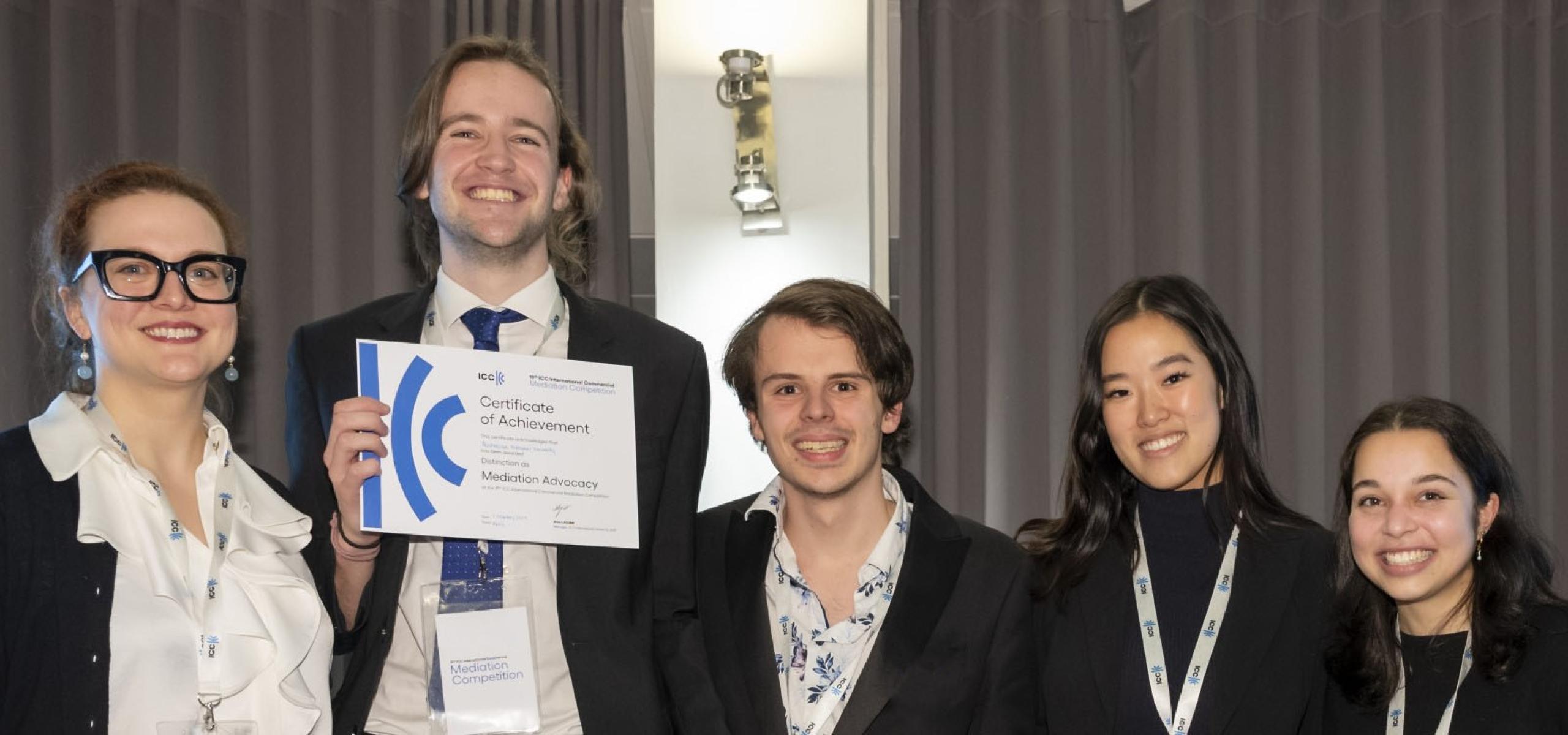
Image: International Chamber of Commerce Representative, Lachie Macfarlan, Conner McKillop, Thu Vu and Neha Kalele.
We are incredibly grateful and honoured to have been awarded the Distinction in Mediation Advocacy award. This Award is an acknowledgement of our strengths in teamwork and legal advocacy.
A group of ANU College of Law students have been recognised at the 19th International Chamber of Commerce (ICC) Commercial Mediation Competition, the world’s largest student mediation competition.
The ANU team, featuring Thu Vu, Neha Kalele, Conner McKillop and Lachie Macfarlan, received the award for “Distinction in Mediation Advocacy”, an honour for the team who best embodied the role of a lawyer advancing their client’s interests in the preliminary rounds.
“We are incredibly grateful and honoured to have been awarded the Distinction in Mediation Advocacy award. This Award is an acknowledgement of our strengths in teamwork and legal advocacy,” Neha says on behalf of her team.
“As this was the College's first time competing in the ICC Mediation Competition, we were pleasantly surprised to have received the accolade. We’re incredibly grateful for this amazing experience in alternative dispute resolution, and hope that future ANU teams might be encouraged to continue ANU’s commitment to mediation.”
Held annually in Paris each February, the ICC Mediation Competition is a globally-renowned event that hosts more than 100 mock mediation sessions about fictional international commercial disputes throughout ICC Mediation Week.
Attracting 47 teams from 31 countries, the competition represented an opportunity for the team to diversify their understanding of mediation and showcase the College’s proficiency in dispute resolution.
“Having previously competed in domestic competitions, we were motivated by the global nature of the ICC Mediation Competition and the expertise of participants. Instead of relying upon in-class learning we wanted to challenge ourselves, meet like-minded young professionals and engage closely with skilled mediators,” Conner says.
The team also loved learning from other students from five different continents about their diverse perspectives on international mediation, and how alternative dispute resolution practices can be further integrated into the day-to-day operation of Australia’s legal system.
Upon reflection, Lachie says, “it was initially rather daunting to enter an environment filled with highly experienced professionals and well-drilled international teams. Yet, adapting to competitors’ starkly different ways of negotiating was enlightening – it forced us to reflect on our own negotiation styles, and to adapt to culturally different expectations relating to the norms of interest-based bargaining.”
“It made us not only better negotiators but better communicators as well,” Conner adds.
Adapting to diverse negotiating styles was not the only challenge faced by the team. With various commitments to clerkships, exchanges, study tours and family holidays, there were never more than two team members living in the same time zone during the three month-long preparation period.
“Late night zoom calls and unstable internet connections were unfortunately not uncommon. So, it was a fantastic feeling when all four of us finally had our first meal together in Paris, just 12 hours before the first round of the competition.”
All four members of the team encourage students to consider getting involved in as many of the ANU competitions as you can, especially negotiations.
“This will really equip you with many of the skills that we used during the competition. Teamwork, communication, creative thinking and relationship building are among the things we focused on. The Mediation Skills Practicum at ANU is also a great option to learn more about mediation and what it’s like to be in the shoes of the mediator,” Thu says.
“We would also encourage students to undertake an overseas exchange or complete an overseas course with the ANU College of Law, especially given the University’s generous funding support for these opportunities (see ANU College of Law Discretionary Student Financial Support).”
“Before we entered the competition, each team member had either represented ANU in another international competition, or undertaken a semester-long study exchange. We found that the interpersonal skills you gain from meeting people from other countries were immensely important in the ICC Mediation Competition, since the competition focused mainly on international disputes and how to navigate those barriers.”
Read more about the ICC International Commercial Mediation Competition.